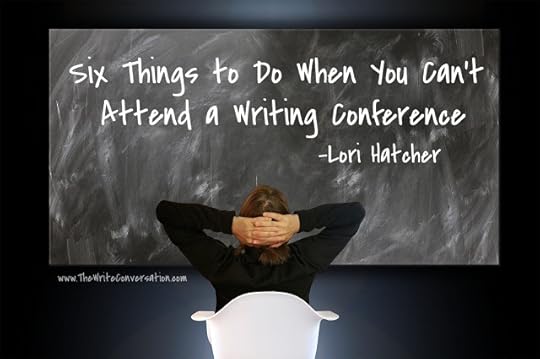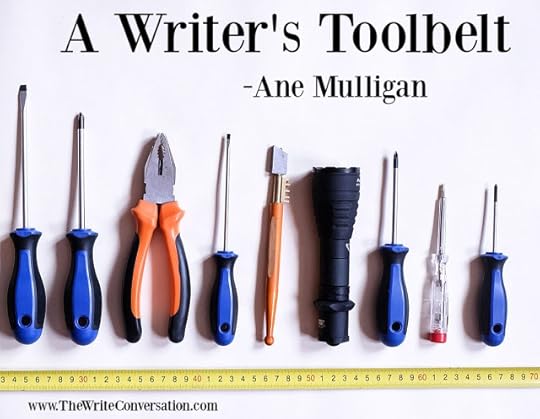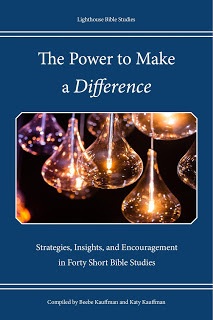Edie Melson's Blog, page 208
February 27, 2020
Six Things to Do When You Can’t Attend a Writing Conference

by Lori Hatcher @LoriHatcher2
Are you planning to attend a writers conference this year? Maybe not. Perhaps health issues, family dynamics, financial challenges, or a demanding work schedule have left you on the sidelines sighing over Facebook posts and conference invites.
If you can’t attend a conference, you can still move forward in your writing life. Here are six suggestions:1. Subscribe to an Industry Blog.The internet is swimming with well-written, timely blogs for writers. A few of my favorites (in addition to The Write Conversation) are The Steve Laube Agency Blog, the Jane Freidman blog, and The Writing Life, by Terry Whalin.
2. Subscribe to a Conference BlogMany conferences have blogs associated with them, like the Blue Ridge Mountains Christian Writers Conference blog.Posts are written by industry experts and conference faculty, giving you the benefit of FREE expert advice and coaching.
3. Listen to Writing PodcastsIf you prefer to learn by audio, tap into podcasts for writers. I listen to at least two writing podcasts a week and always come away with invaluable tips and information. The portability of podcasts enables me to listen on the go and while multi-tasking. Despite the fact that I often have to stop and scribble down some brilliant idea, these are a great way to fit learning into my busy life. Check out the Christian Publishing Show with Thomas Umstaddt, Jr. or Mignon Fogarty’s Grammar Girl.
4. Take a CourseWhen you exhaust the ocean of free information, consider paying a small fee to take a specific course. This can be especially helpful when you need targeted, in-depth information or training. My favorite go-to sites for well-written courses are The Christian Writers Institute and Serious Writer Academy.
5. Consider the every-other-year planIf you can’t spend the time or money to attend a conference every year, don’t write it off completely. Attend every other year. In the off year, begin saving for the next conference. The cost of attending, spread over two years, is very manageable, especially if you begin tucking money away the day after the previous conference.
To attend an eight-hundred dollar conference, you’ll need to save $7.69 a week. Most of us spend this amount mindlessly on lunch or coffee. Skip the latte, tuck the money away, and when conference season rolls around, you’ll be able to pay for it in cash.
If you’d like to attend annually, you’ll need to save $15.39 a week. What can you cut out of your budget for the pleasure of attending a conference? I guarantee you, when you’re sitting in that auditorium, surrounded by writers and faculty who get you, you’ll never regret skipping that weekly Caramel Macchiato.
6. Purchase Audio RecordingsWhen you do attend a conference, purchase the audio recordings. During the off year, listen to a class a week. Last year I attended the Blue Ridge Mountains Christian Writer’s Conference and purchased the MP3s. Now, nine months later, I’m still working my way through the classes. For $80, I’ve had the privilege of listening to every single workshop at the conference, some of them multiple times.
Writers conferences are invaluable for helping us hone our craft, network with other writers, and find inspiration. It’s one of the best ways to move forward in our writing journey. If you can’t attend one, you don’t have to sit idly by, marking time until you can. Take one of the steps I’ve recommended—right now. As you do, you’ll fan the flames of your writing fire and prepare yourself for the opportunities the Lord will bring your way.
Now it’s your turn. What do you do on non-conference years to keep growing as a writer? Leave a comment below and join the conversation.
TWEETABLESix Things to Do When You Can’t Attend a #Writing Conference - @LoriHatcher2 on @EdieMelson (Click to Tweet)
 Lori Hatcher loves to teach, train, and encourage writers by sharing what others have generously shared with her. Connect with her this spring at the Carolina Christian Writers Conference, where she’ll serve on faculty as the conference Chaplain, and at Blue Ridge Mountains Christian Writers Conference. Lori is the author of several devotional books including
Refresh Your Faith – Uncommon Devotions from Every Book of the Bible
(Our Daily Bread Publishing) and
Hungry for God … Starving for Time, Five-Minute Devotions for Busy Women
, the 2016 Christian Small Publisher Book of the Year. The editor of
Reach Out, Columbia
magazine, she’s also a blogger, writing instructor, and inspirational speaker. You’ll find her pondering the marvelous and the mundane on her blog, Hungry for God. . . Starving for Time . Connect with her on Facebook, Twitter (@LoriHatcher2), or Pinterest (Hungry for God).
Lori Hatcher loves to teach, train, and encourage writers by sharing what others have generously shared with her. Connect with her this spring at the Carolina Christian Writers Conference, where she’ll serve on faculty as the conference Chaplain, and at Blue Ridge Mountains Christian Writers Conference. Lori is the author of several devotional books including
Refresh Your Faith – Uncommon Devotions from Every Book of the Bible
(Our Daily Bread Publishing) and
Hungry for God … Starving for Time, Five-Minute Devotions for Busy Women
, the 2016 Christian Small Publisher Book of the Year. The editor of
Reach Out, Columbia
magazine, she’s also a blogger, writing instructor, and inspirational speaker. You’ll find her pondering the marvelous and the mundane on her blog, Hungry for God. . . Starving for Time . Connect with her on Facebook, Twitter (@LoriHatcher2), or Pinterest (Hungry for God).
Published on February 27, 2020 22:00
February 26, 2020
Who Are You Depending on as You Write?

by Henry McLaughlin @RiverBendSagas
Trust in the Lord with all your heart; do not depend on your own understanding. Seek his will in all you do, and he will show you which path to take. Proverbs 3:5-6 (NLT)
Over the last couple of years, I spent a large amount of time working on a novel. The concept was unique. At least, I’d never discovered any other book with a similar plot. The characters were fascinating. I even developed an exciting plot twist for the end that I had never envisioned during the writing.I really liked the story and wanted to move forward with it. One agent asked for the full manuscript, but later turned it down. That didn’t dissuade me. I’m used to rejection.
But the feedback I received from beta readers also brought me up short. Something seemed off to them. One reader in particular thought the story was too edgy and thought the characters were too wrapped in the secular world and all its trappings. The more I worked on revisions, the more disturbed I got in my spirit. My mind told me it was a good story and to keep tweaking it. My heart told me there was something wrong with it and to stop writing.
Finally, I went to God in prayer about it. Notice I wrote “finally.” I waited until I was so stuck I couldn’t figure my way out. Instead of going to him first, I went to him last.
Our conversation went something like this:
God: “Did I tell you write that story?”
Me: “Well no, but it’s a really good idea.”
God: “Did I tell you to write that story the way you wrote it?”
Me: “No, but you know me. I follow my characters and let them reveal the story to me.”
God: “Did I tell you to use those characters?”
Me: “No, but they’re really good characters.”
God: “Does your story honor or glorify Me?”
Me: Long pause while honesty works in my soul. “No.”
God: “Then maybe that’s why you no longer have peace about it. Maybe that’s why you’re struggling through the rewrite. So, what are you going to do now?”
Me: Another long pause of meditation until the answer became clear. “I’m going to give it up. And I repent for not seeking you first and trusting you.”
God: “I love you.”
I immediately deleted all my files and backups.
The lesson I learned is summed up in Proverbs 3:5-6 (NLT). I did not trust the Lord with the story. Instead I relied on my own understanding and ended up in a mess. He reinforced the lesson to seek his will, to trust him to show me the path to take in my writing and in every other area of my life.
How about you? How have you allowed God to lead you? What have you done when you discover you’re off his path?
TWEETABLE
Who Are You Depending on as You Write? - insight from Henry McLaughlin, @RiverBendSagas on @EdieMelson (Click to Tweet)
 Henry’s debut novel, Journey to Riverbend, won the 2009 Operation First Novel contest.
Henry’s debut novel, Journey to Riverbend, won the 2009 Operation First Novel contest.Henry edits novels, leads critique groups, and teaches at conferences and workshops. He enjoys mentoring and coaching individual writers.
Connect with Henry on his blog, Twitter and Facebook.
Published on February 26, 2020 22:00
February 25, 2020
7 Traits of Intentional Writers

by DiAnn Mills @DiAnnMills
Intentional writers refuse to consider if or when they will succeed. These writers know where they are going in the publishing world because they understand the value of persistence and hard work.
So how can we writers be termed as intentional? Is it an innate trait or one we must learn? Is the process difficult?Let’s examine 7 traits of an intentional writer in alphabetical order.
AmbitiousIntentional writers plan their careers. They are purposeful and motivated. Their zeal and passion for writing shows in all they do. Ambitious writers add another line to the dictionary’s definition of “enthusiasm.”
DeterminedIntentional writers seize control of their careers. They take steps to learn all about the craft and the publishing industry. Acquiring knowledge is an engine additive to determined writers. Continuous learning becomes a fact of life.
DreamerIntentional writers understand the value of dreaming, especially when they are willing to ensure the writing and editing are completed to achieve their dreams and desires.
FocusedIntentional writers focus on the heart of their purpose. They emphasize on what is needed to give them professional satisfaction. Nothing interferes with their concentration.
Goal-OrientedIntentional writers are goal-oriented. They understand great achievements are won by taking baby steps, like eating an elephant one bite at a time. If a rejection hits them, they are prepared to handle the news and move forward.
OrganizedIntentional writers are organized. Calendars, research, spreadsheets, analytics, and copious notes are their best friends and help them meet deadlines.
RealisticIntentional writers keep logic in the forefront. While they are creative and dreamers (see #3), they are also practical and level-headed. Writing takes time, and the publishing industry can be slow. Maintaining an attitude of realism will the intentional writer on solid ground.
What is an intentional writer tip you have found successful?
TWEETABLE
7 Traits of Intentional Writers - @DiAnnMills on @EdieMelson (Click to Tweet)
 DiAnn Mills is a bestselling author who believes her readers should expect an adventure. She creates action-packed, suspense-filled novels to thrill readers. Her titles have appeared on the CBA and ECPA bestseller lists; won two Christy Awards; and been finalists for the RITA, Daphne Du Maurier, Inspirational Readers’ Choice, and Carol award contests.
DiAnn Mills is a bestselling author who believes her readers should expect an adventure. She creates action-packed, suspense-filled novels to thrill readers. Her titles have appeared on the CBA and ECPA bestseller lists; won two Christy Awards; and been finalists for the RITA, Daphne Du Maurier, Inspirational Readers’ Choice, and Carol award contests. She is the director of the Blue Ridge Mountain Christian Writers Conference, Mountainside Marketing Retreat, and Mountainside Novelist Retreat with social media specialist Edie Melson. Connect here: DiAnnMills.com
Published on February 25, 2020 22:00
February 24, 2020
Give Your Social Media a Workout and Get it Into Tip-top Shape

By Edie Melson @EdieMelson
We all know the importance of staying in shape.
Today I’m going to give you a workout plan to keep your social media life in shape.
To stay efficient at social media we’ve got to be lean.
After all our goal is a writing life, not a marketing one.
To work efficiently online takes training and discipline.
Sit Ups: This is the one where you sit up and take notice of what’s going on around your digital neighborhood.
Strength Training: Where do you have the most followers and friends? That’s where you need to invest the majority of your time. For me, that’s twitter. I have over 20,000 Twitter followers, so I make sure my interactions on that platform stay fresh and current. I also spend time on Facebook, but not as much because I don’t have as strong a presence there.
Push Ups: Make it a practice to push up your numbers. Spend a short time each day adding new friends and followers on social media. The best way to do this (actually the only way I recommend)? Be a friend to have a friend.
Hurdles: Look at the obstacles ahead of you. If you're struggling with something take a run at it. Learn a new skill to keep your social media on track and moving forward.
Sprints: Keep watch on the amount of time you spend on social media. Don’t go over that 30 minute a day threshold. Don’t forget the law of diminishing returns. After 30 minutes, your productivity and value goes way down.
Endurance Training: Remember this thing called social media takes time—it’s a marathon. Take small consistent steps and you’ll find success every time.
Cardio: Make sure you follow your heart and your passion. Share things that mean something to you, and you'll be valuable to those who follow you.
Now it’s your turn, what exercise would you add to this social media workout routine?
Don’t forget to join the conversation!Blessings,Edie
TWEETABLES
Give Your Social Media a Workout and Get it Into Tip-top Shape - @EdieMelson (Click to Tweet)
 Edie Melson is a woman of faith with ink-stained fingers observing life through the lens of her camera. No matter whether she’s talking to writers, entrepreneurs, or readers, her first advice is always “Find your voice, live your story.” As an author, blogger, and speaker she’s encouraged and challenged audiences across the country and around the world. Her numerous books reflect her passion to help others develop the strength of their God-given gifts and apply them to their lives. Connect with her on her website, through Facebook, Twitter and Instagram.
Edie Melson is a woman of faith with ink-stained fingers observing life through the lens of her camera. No matter whether she’s talking to writers, entrepreneurs, or readers, her first advice is always “Find your voice, live your story.” As an author, blogger, and speaker she’s encouraged and challenged audiences across the country and around the world. Her numerous books reflect her passion to help others develop the strength of their God-given gifts and apply them to their lives. Connect with her on her website, through Facebook, Twitter and Instagram.
Published on February 24, 2020 22:00
February 23, 2020
A Writer's Toolbelt

by Ane Mulligan @AneMulligan
My husband is an artist and our Community Theatre's set designer. When he plans a new set, he lays out his favorite tools before he begins the work. Pens, pencils, rulers, angle finders, compasses, geometric shape templates, etc. all laid out within arm's reach. It's quite an array. If it's a painting he's working on, he has at least a dozen tubes of oil paint next to his easel and dabs of at least a half-dozen others already on his palette.
I have a similar routine when I begin a new book. I first open a new project in Scrivener , my preferred writing software. I populate it with a character interview for each point-of-view character. There are a couple of tools in the interview that are important tools:
1. goal, motivation, and conflict (I use What, Why & Why Not instead)
2. the lie my characters believe
Once I figure out the lie my POV characters believe, I write a stream-of-conscience backstory. I have to insert here that often during this exercise, I get some surprises that can change the lie. I always go with what the character tells me.
Besides what's in my computer, I have an array of tools on my desk. These are my favorite writers’ tools:
1. List of quirks and habits (every character needs at least one). In my new release In High Cotton (Aug 2020), a secondary character chews cloves. They were a good cure for bad breath back in the 1920s.
2. A Flip Dictionary (I'm on my second copy, the first having fallen apart from use).
3. The Emotion Thesaurus , by Angela Ackerman & Becca Puglisi. There are several types. I have the original, then I bought The Negative Trait Thesaurus , The Positive Trait Thesaurus , and The Emotional Wound Thesaurus.
4. I'm a visual writer, so before I fill out any of the character interview, I find photos of my characters. I keep a file filled with pics cut from magazines, and I also haunt the internet for them. I don't often use actors' photos, although I have been known to, especially if they played a character in a movie that fits my image for my heroine/hero. Another caveat to that is if the actor's personality fits my character. But my preference is an unknown. That way I don't ascribe a trait that is the actor's and not my character's.
My final tool is a map. If I'm using a fictional town, I make a map of where every store and house resides within my town. For my Chapel Springs series, I posted the map on my website, making sure I linked that to any social media post or blog interview. I also made a postcard with the map on one side and the book covers on the other and handed those out at book signings. I'm delighted my publisher is putting the town map of Rivers End in my book In High Cotton.
If the town is real, I use actual maps. With On Sugar Hill, that was a little difficult. In 1929, Sugar Hill wasn't a town, but a militia district from the Civil War (you know, the war of late unpleasantness). The town didn't incorporate until 1939. So history was sketchy, and maps weren't very inclusive. I interviewed a lot of locals who had lived here all their lives to get the information I needed.
Those are my favorite and vital writing tools. I have others, but those are the first ones I reach for. What are your favorite tools? I hope you'll share. I'm always looking for new ones to add to my toolbelt.
TWEETABLEA Writer's Toolbelt - @AneMulligan on @EdieMelson (Click to Tweet)
 Ane Mulligan has been a voracious reader ever since her mom instilled within her a love of reading at age three, escaping into worlds otherwise unknown. But when Ane saw Mary Martin in PETER PAN, she was struck with a fever from which she never recovered—stage fever. She submerged herself in drama through high school and college. Years later, her two loves collided, and a bestselling, award-winning novelist emerged. She resides in Sugar Hill, GA, with her artist husband and a rascally Rottweiler. Find Ane on her website, Amazon Author page, Facebook, Twitter, Instagram, Pinterest and The Write Conversation.
Ane Mulligan has been a voracious reader ever since her mom instilled within her a love of reading at age three, escaping into worlds otherwise unknown. But when Ane saw Mary Martin in PETER PAN, she was struck with a fever from which she never recovered—stage fever. She submerged herself in drama through high school and college. Years later, her two loves collided, and a bestselling, award-winning novelist emerged. She resides in Sugar Hill, GA, with her artist husband and a rascally Rottweiler. Find Ane on her website, Amazon Author page, Facebook, Twitter, Instagram, Pinterest and The Write Conversation.
Published on February 23, 2020 22:00
February 22, 2020
Qualities vs. Symptoms

by Rhonda Rhea @RhondaRhea
Not to toot my own horn or anything, but I think I have some very unique and useful character qualities. Granted, most better psychoanalysts might not refer to them as “character qualities” as much as they refer to them as “symptoms,” but still.
I think writers acquire an exclusive symptom or two…make that a “quality” or two…that others don’t necessarily encounter. Maybe it’s the inordinate amount of rejection we’re called to deal with, but insecurity is so often the order of the day. Not to mention that when fiction writers hear new little voices in their heads, they never medicate. No, they actually encourage the little voices. And then publish them. This week, though, I experienced a “quality” beyond voices. It’s a weird thing that happens to me now and again. I look over the writing du jour and I keep thinking I’ve misspelled words—even when I haven’t.
I think I might be a typo-chondriac.
Interestingly enough, if the psycho-professionals come up with a 12-step program for typo-chondriacs, I’m pretty sure step one will be admitting you don’t have a problem.
When it comes to successfully walking out this life for Christ, though, we have to recognize right from the get-go our complete lack of ability to make it happen ourselves. We do have a problem. And without surrendering to the leadership of God’s Holy Spirit, there’s no hope for resolving that problem. No 12-step program. No self-help book. Personally speaking, I don’t even have a horn to toot. Not a leg to stand on. Not a keyboard to type on. It’s got to be all Him and zero me.
You’d think that would cause a more intense insecurity than even a writer has to bear. But it doesn’t. As a matter of fact, it’s the exact opposite. There is great security in knowing that I don’t have to depend on my own abilities. There is even greater security in knowing that I can so completely depend on the One who is all-powerful. Paul reminds us in Philippians 3:3 that, “We rely on what Christ Jesus has done for us. We put no confidence in human effort,” (NLT).
The Amplified version of Philippians 3:3 puts it this way: “Put no confidence or dependence on what we are in the flesh and on outward privileges and physical advantages and external appearances.” That pretty much settles it. Nothing we’ve done. Nothing we’ve said. Nothing we are. Nothing inside us. Nothing outside us. Victory in the walk of faith will only happen as we rely totally and completely in the all-powerful one. And in Him our security is sure.
So it’s not such a terrible thing to recognize that even though I’m a writer, with all the built-in insecurities and various “qualities” that come with it, I don’t have to live in insecurity. There’s freedom in recognizing I have nothing to offer in and of myself, but that “I can do all things through Christ who strengthens me,” (Philippians 4:13, NKJV).
That’s especially refreshing to dwell on when I realize that on top of my typo-chondria, I think I might be coming down with a touch of kleptomania. Gee, I hope there’s something I can take for that.
TWEETABLE
Qualities vs. Symptoms - insight from @RhondaRhea on @EdieMelson (Click to Tweet)
 Rhonda Rhea is a humor columnist for lots of great magazines, including HomeLife, Leading Hearts, The Pathway and more. She is the author of 10 nonfiction books, including How Many Lightbulbs Does It Take to Change a Person? and coauthors fiction with her daughter, Kaley Faith Rhea. She and her daughters host the TV show, That’s My Mom, for Christian Television Network’s KNLJ. Rhonda enjoys traveling the country speaking at all kinds of conferences and events. She and her pastor/hubs have five grown children and live in the St. Louis area.
Rhonda Rhea is a humor columnist for lots of great magazines, including HomeLife, Leading Hearts, The Pathway and more. She is the author of 10 nonfiction books, including How Many Lightbulbs Does It Take to Change a Person? and coauthors fiction with her daughter, Kaley Faith Rhea. She and her daughters host the TV show, That’s My Mom, for Christian Television Network’s KNLJ. Rhonda enjoys traveling the country speaking at all kinds of conferences and events. She and her pastor/hubs have five grown children and live in the St. Louis area.
Published on February 22, 2020 22:00
February 21, 2020
Getting More Book Reviews on Amazon

by Cathy Fyock @CathyFyock
On one of our recent Author Mastermind calls with newly published authors, we brainstormed about how to get more reviews on Amazon. Here’s the start to our list.
Write a really, really good book! People are more willing to review your book if they love your book.Include a bookmark or postcard in the book thanking the reader for the purchase, and requesting a review on Amazon.
Personally thank your reviewers on social media. You’ll remind others that they will also be rewarded once they post their review. Cut and paste their words in your social media posts (and it may also encourage more book sales).
Be sure to include verbiage within your book driving readers to your opt-in page for a free gift. Once you have the contact information for your readers, request that they write a short review.
For your busy friends, offer to write something if they don’t have time! Send it to them in an email with a link to the Amazon review so it only takes a moment of their time to cut and paste.
When someone tells you how much they love your book, ask them if they would write that up and post in on Amazon. Or, offer to write it for them (see the idea above).
In newsletters and other online communications about your book, include the link to buy your book AND the link to write a review.
Recruit a team of supporters, and send them the book as a pdf to read prior to launch and ask them to write a short review. As soon as the ebook goes live on Amazon, offer it for free, and encourage your team to “buy” it, wait an hour or so, then repost their short review. This way their review will count as a “verified” review. Robbie Samuels used this strategy will his recent launch and got more than 100 verified reviews on the first days of the launch. (Brilliant, Robbie!).
Remember, not everyone will read your book as soon as they buy it (they may save it until their next business trip or weekend), so ongoing reminders will help boost the number of reviewers.
What additional ideas do you have?
TWEETABLEGetting More Book Reviews on Amazon - Tips from @CathyFyock on @EdieMelson (Click to Tweet)
 Cathy Fyock is The Business Book Strategist, and works with professionals and thought leaders who want to write a book as a business development strategy. Since starting her business as a book coach in 2014, she has helped more than 160 professionals become published authors. Her most recent book is The Speaker Author: Sell More Books and Book More Speeches. She can be reached at cathy@cathyfyock.com or 502-445-6539.
Cathy Fyock is The Business Book Strategist, and works with professionals and thought leaders who want to write a book as a business development strategy. Since starting her business as a book coach in 2014, she has helped more than 160 professionals become published authors. Her most recent book is The Speaker Author: Sell More Books and Book More Speeches. She can be reached at cathy@cathyfyock.com or 502-445-6539.
Published on February 21, 2020 22:00
February 20, 2020
Protecting Digital Accounts After Death

by Barbara Latta @BarbaraLatta
Anyone who has a Facebook profile more than likely has at some time had a person clone you and send out friend requests to people you are already friends with. Most people are wise to this now because it happens so frequently, but some unsuspecting Facebook members still click to add the friend and then the fake user starts sending out pleas for help as if they are stranded in another country and they need you, their dear friend, to send money. I have also received friend requests from people who have passed away. This made me think about what happens to these accounts when someone dies. How do we protect digital accounts after the death of a loved one? How do we know what other records they may have that need to be closed or obtained? I have a friend whose husband changed the password on their computer and then he died. He failed to write down what the new password was, and she was not able to sign on to the device. Any documents not saved on an external drive were lost.
Since these inventories are not physical, it is easy to forget about them. We don’t have digital membership cards which remind someone else of our online activity. Because many of us have credit card information stored on websites, a skilled hacker could go online and continue shopping without anyone’s knowledge unless a relative or executor is authorized to access the information.
Hackers are prevalent and sometimes use the newspaper to peruse obituaries. These biographies of deceased persons will contain their full name, date and place of birth and in the case of women, their maiden names. An industrious thief can open accounts in the name of people who have died, and no one is the wiser unless a relative is checking credit reporting sites.
Most of us make wills for our physical possessions so they can be passed down to our beneficiaries, but have you ever considered making a will for digital records? This is something that could be discussed with an attorney and possibly made as a separate will or a document that can be referenced in the will.
Some things to consider would be:Computer password.Email passwordCell phone passwordAny kind of subscription such as Amazon Prime, Roku, Netflix, etc. Online bankingSocial media sites such as Facebook, Twitter, Instagram, Snapchat, etc.Frequent flyer miles PayPal or Apple IDOnline stock trading Credit reporting sitesShopping websites
Each web address should have guidelines for admittance or closing the username for a deceased person. Reading these before proceeding with any activity can make sure everything is done in a legal manner.
Our list of online activity can grow each year, so it would be a good idea to evaluate our digital possessions and update any recorded information as it changes. If we make this a regular occurrence, we will be more likely to have updated information for whoever we are assigning as an executor or beneficiary.
In the technological age we live in, our property has changed. Protecting it also means protecting beneficiaries after we are gone. Our digital footprint shouldn’t be left behind for hackers.
What other advice do you have for protecting online assets?
TWEETABLEProtecting Digital Accounts After Death - tips from @BarbaraLatta on @EdieMelson (Click to Tweet)
 Barbara Latta is the author of God’s Maps, Stories of Inspiration and Direction for Motorcycle Writers and has contributed to several anthologies and written for online devotion and article sites. Her latest contribution is to The Power to Make a Difference published by Lighthouse Bible Studies. She also writes a monthly column in her local newspaper, The Pike Journal-Reporter, and is President of the Madison, Georgia Word Weavers chapter.
Barbara Latta is the author of God’s Maps, Stories of Inspiration and Direction for Motorcycle Writers and has contributed to several anthologies and written for online devotion and article sites. Her latest contribution is to The Power to Make a Difference published by Lighthouse Bible Studies. She also writes a monthly column in her local newspaper, The Pike Journal-Reporter, and is President of the Madison, Georgia Word Weavers chapter. Barbara works as a paralegal and loves to travel, garden, snap photos and ride with her husband on his motorcycle. She is studying through Charis Bible College to help her attain a deeper understanding of the scriptures and is working to begin a teaching and speaking ministry. She is currently a member of Toastmasters International.
Her desire is to share the truths she has learned through the Word of God to help those in bondage to negative emotions become free and have an intimate relationship with our heavenly Father. Her blog can be found at www.barbaralatta.blogspot.com. You can also connect with Barbara on Twitter @barbaralatta and follow her on Facebook.
Published on February 20, 2020 22:00
February 19, 2020
Top 12 Ergonomic Writing Tips

by Susan U. Neal RN, MBA, MHS @SusanNealYoga
Do you have a physical condition that is aggravated by writing? I do. I suffer from a right wrist injury from gardening that flares up when I do a lot of cutting and pasting on my computer. Writers perform repetitive movements that can injure muscles, ligaments, tendons, and nerves. A common injury is carpal tunnel syndrome, but repetitive motions can also cause back and neck injuries. However, we can use strategies to prevent injuries and help heal them.First, perform an ergonomic assessment of your writing area. This includes your desk, chair, computer screen, keyboard, and items that you use routinely. Please take note of the following twelve tips, during your assessment, to keep your body from being injured as a result of this trade. Assess your writing chair; does it provide proper back support, and are your feet placed flat on the floor? Studies show that a reclined posture of 100–110 degrees is best versus 90 degrees. Your head and neck should be as straight as possible. Recently, I invested in myself and my writing career by purchasing a Stressless reclining chair by Ekornes and the attachable computer table. The table attaches to the chair and swivels so I can move it out of the way when getting in and out of the chair. It allows me to sit in a slightly reclined position with my laptop on the computer table directly above my lap.Ensure your computer screen is directly in front of you versus angled to one side. The height of the screen should be at a level where the user does not have to tilt their head up or bend their neck down to see it. The user’s eyes should be at a level that is 2–3 inches below the top of the monitor.Check the level of your keyboard so that your wrists are straight/flat and not bent up or down. Your elbows should be at 90 degrees or greater and close to your body. Buy an adjustable computer stand for working on your computer while standing. It is beneficial to change positions so we do not sit all day long. With a computer stand, you stand up and read from your computer screen. Click here to see the one I purchased. If you have a bar-high countertop, this level works almost as well. I stand when I am reading and editing my work.Purchase a swiss ball to sit on occasionally while working on your computer. Swiss balls are large, heavy-duty inflatable balls that provide constant micro-movement in your back to help prevent back injuries. If you suffer from back problems, a swiss ball may help. Occasionally, I also use an orthopedic seat/tailbone shield that keeps my back in proper alignment.Use a wrist/hand brace to prevent or treat wrist injuries. I purchased the type that is like a thin glove that goes over my wrist, but the fingers are cut out (support glove). This brace helped me to keep writing when I had a deadline, but my wrist injury flared. My right wrist injury primarily flares when I repeatedly cut and paste. Therefore when I perform this repetitive motion, I place my right hand on my lap and only use my left hand. This helps to improve and prevent additional injury to my wrist. Do you utilize techniques to prevent aggravating a physical condition?Dictate more of your writing versus typing. I dictate into the Notes app of my iPhone and email it to myself. I cut and paste the email into a Word document. That is how I started this article. Exercise classes such as Pilates and Christian yoga help prevent and heal injuries. Walking is very beneficial. Weight training for the upper body and back helps improve improper writing posture.Minimize eye strain because it can cause headaches, sore neck/shoulders/back, and difficulty concentrating. Determine when was the last time you had an eye exam. Are your glasses prescription strong enough? Make sure you have adequate lighting. I sit by a window for natural light. When I read items on paper, I turn on a floor lamp behind my chair to provide additional lighting. Invest in blue light glasses to protect your eyes and prevent eye strain. Blue light is emitted from your computer screen and other screens that you use and can make it more difficult to fall asleep at night. Santa got me this pair of Blublox glasses for Christmas, and I like them. Minimize screen time after dark and lower the lights in your home to improve sleep.Give yourself a Sabbath break from writing on Sundays. Instead go out for a long walk at a nearby state park or nature trail. Get back to the natural beauty that God created. Walking and rest declutters your mind and sparks creativity.
These twelve ergonomic tips plus Tips to Stay Physically Active When Writing and Healthy Writer Habits will help you maintain your physical fitness. Writing is a physically taxing career. To ensure our body’s sustainability, we need to be smart about the habits and tools we use to take care of our bodies. When you take care of your physical health, you produce your best work for the Lord.
TWEETABLETop 12 Ergonomic Writing Tips - @SusanNealYoga on @EdieMelson (Click to Tweet)
 Susan U. Neal, RN, MBA, MHSSusan’s mission is to improve the health of the body of Christ. She has her RN and MBA degrees, as well as a master’s in health science. She is a CERTIFIED HEALTH AND WELLNESS COACH with the American Association of Christian Counselors. She published five books, the Selah award winner
7 STEPS TO GET OFF SUGAR AND CARBOHYDRATES
,
CHRISTIAN STUDY GUIDE FOR 7 STEPS TO GET OFF SUGAR AND CARBOHYDRATES
, HEALTHY LIVING JOURNAL, SCRIPTURE YOGA a #1 Amazon best-selling yoga book, and
YOGA FOR BEGINNERS
which ranked #3. She published two sets of Christian Yoga Card Decks and two Christian Yoga DVDs that are available at CHRISTINAYOGA.COM. Her digital product
HOW TO PREVENT, IMPROVE, AND REVERSE ALZHEIMER’S AND DEMENTIA
is a great resource. To learn more about Susan visit her website SUSANUNEAL.COM You can also connect with Susan on FACEBOOK, TWITTER, and INSTAGRAM.
Susan U. Neal, RN, MBA, MHSSusan’s mission is to improve the health of the body of Christ. She has her RN and MBA degrees, as well as a master’s in health science. She is a CERTIFIED HEALTH AND WELLNESS COACH with the American Association of Christian Counselors. She published five books, the Selah award winner
7 STEPS TO GET OFF SUGAR AND CARBOHYDRATES
,
CHRISTIAN STUDY GUIDE FOR 7 STEPS TO GET OFF SUGAR AND CARBOHYDRATES
, HEALTHY LIVING JOURNAL, SCRIPTURE YOGA a #1 Amazon best-selling yoga book, and
YOGA FOR BEGINNERS
which ranked #3. She published two sets of Christian Yoga Card Decks and two Christian Yoga DVDs that are available at CHRISTINAYOGA.COM. Her digital product
HOW TO PREVENT, IMPROVE, AND REVERSE ALZHEIMER’S AND DEMENTIA
is a great resource. To learn more about Susan visit her website SUSANUNEAL.COM You can also connect with Susan on FACEBOOK, TWITTER, and INSTAGRAM.
Published on February 19, 2020 22:00
February 18, 2020
Make a Difference with Writing—Keep Your Light Shining

by Katy Kauffman @KatyKauffman28
The light in the sanctuary grew steadily in the silence. Adults and children alike handled their stewardship with care—to keep the light shining. A sacred tradition, candlelight passed from person to person in the Christmas Eve service that I watched online. Once every candle was lit, the pastor, Dr. David Jeremiah, stood at the front and led everyone in a simple but poignant song for the moment—“This Little Light of Mine.” Each lit candle symbolized a person who could make a difference. Just as the candlelight illuminated the people’s faces that evening, my heart was illuminated with inspiration to make a difference for God and His kingdom. I may be one person, but I can do my part. And when I join with you, fellow writers, to write for God in this generation, our combined light shines brilliantly for the world to see. This precious little light of mine, how much do I let it shine?
In the darkness of this world, God urges us to keep the light going. His Holy Spirit nudges us to pass on the light we’ve been given.
How can we be faithful stewards of God’s light in four vital areas of life—our words, our actions, our knowledge, and our prayers?
Make a Difference with the Light You Have Been Given
1. Our Words
As you write, pull from the understanding God has given you of Scripture, life, and Himself, and write about a topic you’re passionate about. Help your target audience by answering a question, solving a problem, or meeting a felt need. Share how you needed the light of God’s truth to persevere and what He did to provide it. Depend on the ability God gives you (1 Peter 4:11) to minister to those who need the light.
2. Our Actions
We stay committed to the truth by practicing it. As writers, we have the privilege of learning from the Light of the World and sharing His light with others. Dirty lanterns don’t radiate much light. The way we keep our “lanterns” clean is by living the truths we’re writing about. A life that backs up the words we share is a powerful force for good in this world and a confirmation that what we say, works. A changed life is an inspiration for others to accept God’s light.
3. Our Knowledge
I love my GPS’ satisfying conclusion of every trip I take—“You have arrived.” Yet even the apostle Paul didn’t claim to have “arrived.” In Philippians 2:12 (NKJV), he says, “Not that I have already attained or am already perfected, but I press on.” As writers, we press on to new heights of spiritual understanding and heart transformation. We constantly seek to grow in our knowledge of both the truth and the writing craft, so we can give excellence in every light-sharing instance. Taking in more light keeps our candles constantly lit. We never stop growing.
4. Our Prayers
“Be serious and watchful in your prayers” (1 Peter 4:7 NKJV). Staying close to God in prayer keeps us close to the source of truth and guides us as we write. Prayer prepares the writer to write and the reader to read. God knows which words to use for which audience. He knows how to weave the dazzling colors of His light together to create a brilliant shaft of truth that penetrates the darkness, revives the soul, shatters lies, and chases away evil. Praying through every project unleashes His power in our writing. Then we know that our words came from Him.
We can make an eternal difference for God and His kingdom. Which of the four ways above do you think would help writers to shine the best for God?
 Book Giveaway: If you comment on this post by Friday, February 21st, at 2 pm, you will be entered into a drawing for a new book,
The Power to Make a Difference
. Published by my family’s company, Lighthouse Bible Studies, this book shares strategies, insights, and encouragement in forty short Bible studies written by twenty-seven authors. The four sections discuss the power of words, the power of doing, the power of knowing, and the power of prayer. So be sure to comment! I’ll pull a name for our drawing on Friday afternoon and announce the winner in a comment on this post. Then I’ll contact the winner for a mailing address.
Book Giveaway: If you comment on this post by Friday, February 21st, at 2 pm, you will be entered into a drawing for a new book,
The Power to Make a Difference
. Published by my family’s company, Lighthouse Bible Studies, this book shares strategies, insights, and encouragement in forty short Bible studies written by twenty-seven authors. The four sections discuss the power of words, the power of doing, the power of knowing, and the power of prayer. So be sure to comment! I’ll pull a name for our drawing on Friday afternoon and announce the winner in a comment on this post. Then I’ll contact the winner for a mailing address.Keep making a difference for God, dear writer. Keep your light shining.
TWEETABLEMake a Difference with Writing—Keep Your Light Shining - @KatyKauffman28 on @EdieMelson (Click to Tweet)
 Katy Kauffman is an award-winning author, an editor of Refresh Bible Study Magazine, and a co-founder of Lighthouse Bible Studies. She loves connecting with writers and working alongside them in compilations, such as Heart Renovation: A Construction Guide to Godly Character, which was a 2019 Selah Awards finalist and Director’s Choice finalist. She is planning a sequel to another Selah finalist, Breaking the Chains (2017), titled Sustaining Life’s Victories.
Katy Kauffman is an award-winning author, an editor of Refresh Bible Study Magazine, and a co-founder of Lighthouse Bible Studies. She loves connecting with writers and working alongside them in compilations, such as Heart Renovation: A Construction Guide to Godly Character, which was a 2019 Selah Awards finalist and Director’s Choice finalist. She is planning a sequel to another Selah finalist, Breaking the Chains (2017), titled Sustaining Life’s Victories.Katy’s writing can be found at CBN.com, thoughts-about-God.com, the Arise Daily blog, and two blogs on writing. She loves spending time with family and friends, making jewelry, and hunting for the best donuts. Connect with her at her blog, The Scrapbooked Bible Study, and on Facebook and Twitter.
Published on February 18, 2020 22:00



